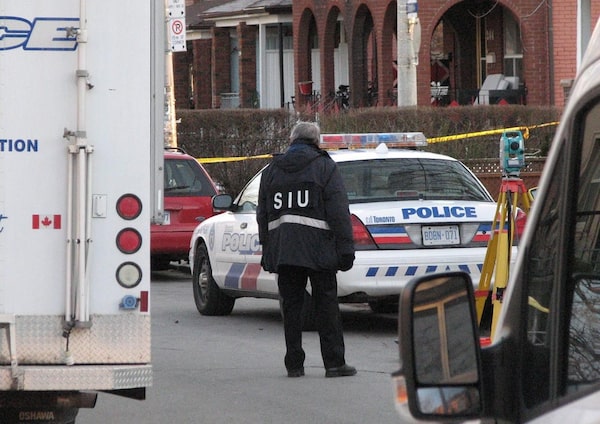
A Special Investigations Unit investigator works at the scene of a shooting in Toronto on Feb. 20, 2012.The Canadian Press
In early July, Lethbridge Police posted two short notices of decisions in discipline hearings. In one, an unnamed officer admitted to five counts of misconduct, including committing a corrupt practice. In the second, an officer admitted to two grounds of misconduct.
Both officers received temporary demotions. There was no indication of what these officers had done wrong, and no way for the people of Alberta to judge for themselves whether the punishments were insufficient, excessive or appropriate.
The full story emerged soon after, when the 30-page disciplinary decision was leaked. The two Lethbridge Police officers in question had, one morning in 2017, illegally surveilled the provincial environment minister and another person. The officers were apparently unhappy about the then-NDP government’s move to establish two provincial parks in the mountains west of the city, and they decided to abuse their authority to, in effect, extract some kind of payback.
Like a lot of police discipline in Canada, the case and the decision were, until the leak, kept hidden from public view. Those in the dark included the former NDP minister and the current United Conservative Party government’s justice minister. Premier Jason Kenney called the officers’ actions “completely unacceptable” and “deeply disturbing." A third investigation was ordered and plans to reform the province’s Police Act followed.
Canada’s system for dealing with complaints against the police has two problems: In many provinces, cases are dealt with in secret, and investigations of the police are often conducted by the police. The Lethbridge incident encapsulates both problems. Police officers and former officers conducted the investigation, and determined the punishment. Everything was kept behind closed doors.
Last week, Alberta indicated that, as part of a review of its legislation, it intends to make more police discipline public. That is a step in the right direction. The good news is Alberta and other jurisdictions have ready templates they can follow.
In Ontario, the Special Investigations Unit handles incidents involving the police and deaths or serious injuries. It issues detailed reports, including in cases where no charges are laid, which is most of them. A recent prominent example is the case of Regis Korchinski-Paquet, who fell to her death from an apartment balcony in Toronto after police were called. The SIU’s public release of its findings allowed the public to see the evidence for themselves, and to appreciate why the agency concluded that there had been no police misconduct.
In Alberta, while the Serious Incident Response Team upped its public disclosure in the mid-2010s, it isn’t obliged to make its reports public.
A bigger problem with police oversight comes when the allegations against police do not involve violence. The Lethbridge case is such an example. Ontario again offers a template. The Office of the Independent Police Review Director deals with most complaints against police, including those that don’t rise to the level of an SIU investigation. It publishes hearing decisions, with names, in cases with or without penalties. This could be a model for Alberta.
It should also be a model for the RCMP. The RCMP oversight Civilian Review and Complaints Commission receives around 2,000 complaints a year but, citing privacy, publishes barely anything of the results. The commission has recently begun making public a few “sample findings,” but they are short, anonymous and lacking in detail.
Disclosure of police discipline is not a radical idea. Consider how complaints against teachers are handled in Ontario. The province’s College of Teachers publishes decisions, with names, if a teacher is found guilty of misconduct or incompetence. A key guide to better police oversight, broadly applicable across Canada, is a review in Ontario by Appeal Court Justice Michael Tulloch, published in 2017. Because of “serious concerns about real or apparent bias,” independent adjudication of complaints was core among the recommendations, as were "decisions shared with the public at large.”
It’s impossible to overstate the importance of public confidence in Canada’s police. For that confidence to exist, people have to know that police officers are never above the law, and that complaints will be dealt with fairly, fully and impartially, with the results made public. For there to be trust in the police, people must be able to see that justice is served when the conduct of police is in question.
Keep your Opinions sharp and informed. Get the Opinion newsletter. Sign up today.